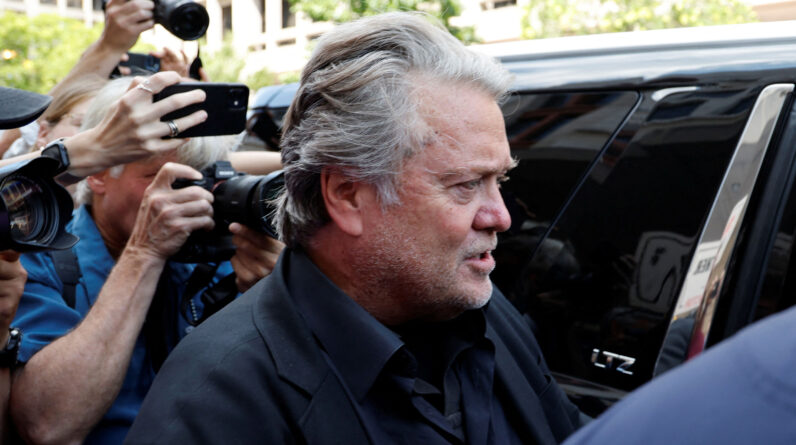
Steve Bannon is followed by the press as he leaves court on Friday. (Jonathan Ernst/Reuters)
A federal jury has found former Trump adviser Steve Bannon guilty of contempt of Congress for defying a subpoena from the House Select Committee investigating the January 6 attack.
If you’re just reading, here are the key things to know about the case and what happens next:
The verdict: After hearing nearly two days of evidence and testimony, the jury reached a unanimous verdict on the two counts of contempt in less than three hours.
Bannon smiled as the verdict was read, looking back and forth between the courtroom deputy and the foreman. Bannon’s team did not mount a defense during the trial, and he did not take the stand. Speaking to reporters after the sentencing, his attorney David Schoen said they planned to appeal the verdict, calling it a “bulletproof appeal.”
In a Justice Department press release promoting the sentencing, U.S. Attorney for the District of Columbia Matthew Graves said that “the subpoena to Stephen Bannon was not an invitation that could be refused or ignored.”
“Mr. Bannon was required to appear before the House Select Committee to testify and provide documents. His refusal to do so was deliberate and now a jury has found that he must pay the consequences,” Graves said.
What happens next: Bannon will be sentenced on October 21. He faces a minimum sentence of 30 days in jail under federal law.
Why Conviction Matters: It’s a victory for the Jan. 6 House select committee as it continues to seek the cooperation of reluctant witnesses in its landmark investigation. It’s also a victory for the Justice Department, which is under intense scrutiny for its approach to matters related to the Jan. 6 attack.
Bannon is one of two uncooperative witnesses at the Jan. 6 committee who has so far been indicted by the Justice Department for contempt of Congress. Trump White House adviser Peter Navarro was indicted by a grand jury last month for failing to comply with a committee subpoena and has pleaded not guilty.
Why the committee wanted Bannon’s cooperation: Bannon was indicted by a federal grand jury in November after he skipped October deadlines to produce the documents and testimony the committee had subpoenaed.
In demanding his cooperation, the committee had pointed to Bannon’s contacts with Trump before the storming of the Capitol, his presence in the so-called war room of Trump allies at the Willard Hotel in Washington the day before the riots and a prediction. he said on his podcast before the riot that “all hell” was going to “break loose.”
“In short, Mr. Bannon appears to have played a multifaceted role in the events of January 6, and the American people have a right to hear his firsthand testimony about his actions,” the commission’s report the House recommends a resolution of contempt against said he. The House voted to hold Bannon in contempt in October.
What both sides said in closing arguments: The Justice Department told the jury that the case was “not complicated” but that it was “important.” “This is a simple case about a man, this man, who didn’t come forward,” said prosecutor Molly Gaston. Bannon, he argued, “didn’t want to recognize the authority of Congress or play by the rules of government.”
Gaston described Bannon’s conduct as a betrayal of his duties as a citizen, saying he had “disdain” for government and for playing by the rules. “The defendant chose loyalty to Donald Trump over compliance with the law,” Gaston said.
Bannon’s team argued in closing that the jury had reason to doubt the case, suggesting the government’s key witness was not impartial. “Mr. Bannon was not in a position to testify” for the committee, his lawyer Evan Corcoran told the jury, as he pointed to statements Trump had made about executive privilege in the House investigation.
The role of executive privilege in the case: When the House committee asked for his cooperation, Bannon’s lawyer claimed that Trump’s stated claims of executive privilege prevented Bannon from testifying or making arguments, an argument the committee roundly rejected. The lawmakers noted that Bannon had not been a government official for years, though they noted his interest in subject areas that did not involve conversations with Trump.
At trial, however, Bannon’s arguments about executive privilege were not a central focus, even as his lawyers found ways to draw attention to the issue. They did so in the face of the judgments of the judge who considered it largely irrelevant, under precedent of appeal, to the elements of the crime of contempt.
Read more about the case and Friday’s proceedings here.
[ad_2]
Source link





